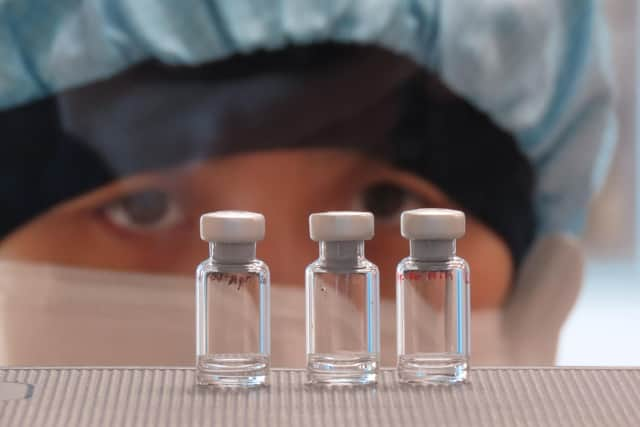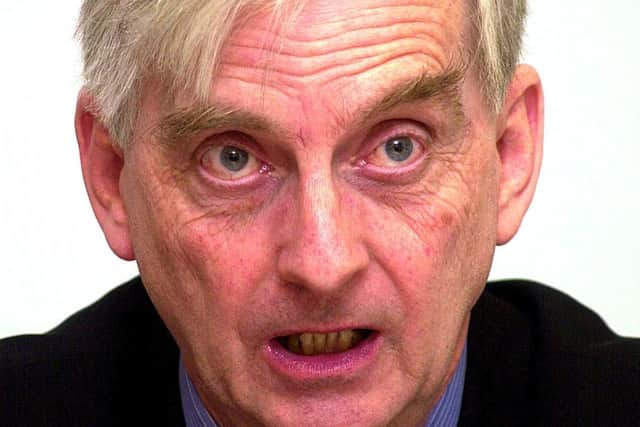Hugh Pennington: Why we must develop vaccine before 'virus has gone away'
Professor Hugh Pennington, from the University of Aberdeen, said that the only way to test a potential cure is to vaccinate the population while Covid-19 is still circulating on a large scale.
However, the professor warns that if the current lockdown measures are successful and the number of cases falls substantially then there will be “hardly any people left to test on”.
Advertisement
Hide AdAdvertisement
Hide AdProfessor Pennington was speaking after concerns were raised that safety steps are being missed by scientists due to the rapid nature of development.


Sarah Gilbert, Professor of Vaccinology at Oxford University, said her researchers hope to begin clinical trials of a vaccine for Covid-19 by the end of the week.
She told BBC Breakfast on Monday that her team have gone through stages of vaccine development that usually take five years in just four months.
However, she said none of the normal safety steps have been missed out and that work which is normally done one stage at a time is being done in "parallel".


Professor Pennington urged caution and warned of the historical example with the measles vaccine where the initial jab made the illness worse because of the way the immune system responded to the virus.
He said: “We know this Covid-19 virus behaves differently in terms of the response from influenza - we can’t translate the experience from that vaccine where we have annual programmes and protect the elderly over to Covid-19 in a straightforward way.
“Before we can roll it out in any scale we will have to test it to see if it protects people against the disease and the only way you can do that is to vaccinate the population while the virus is still circulating on a reasonably large scale.”
He added: “The flu vaccine has traditionally been a dead virus vaccine - you grow the virus then you kill it and that’s what you give to the people.
Advertisement
Hide AdAdvertisement
Hide Ad“There’s also live vaccines and I think what the vaccinologists are looking at is taking a bit of the virus in terms of giving you immune response that works and latching that onto another virus that will grow in the person who’s vaccinated.
“It’s a quasi-live vaccine but it’s not the same as traditional live vaccines like polio and measles which are actual viruses - that have been disabled in such a way that they still go in the patient without causing the disease.”
Professor Gilbert moved to reassure the public that all of the “normal approaches” to safe testing of the vaccine and carefully controlled manufacturing is being done.
She said: “Normally you would do one piece of work, get the results, then apply for funding, then move on to another piece of work - that's not happening this time.
"We are just doing it very at risk - that's not at a safety risk, it means we start paying for work before we know that the the first part has been successful.
"That's why we are able to go faster but it doesn't mean we have missed any of the steps to ensure the vaccine's safety."
Asked if she was confident it will work, Prof Gilbert said: "We have used this vaccine technology before and we have seen it perform very well. We think it is the best thing to use."
Her comments came after the Government's chief scientific adviser, Sir Patrick Vallance, warned that vaccines are "long shots" and people should not rely on the swift development of one for Covid-19.
Advertisement
Hide AdAdvertisement
Hide AdSir Patrick has been put in charge of a Government taskforce which will support efforts to rapidly develop a vaccine as soon as possible.
As well as providing industry and research institutions with the resources and support, the group will review regulations to allow quick and safe vaccine trials.
Writing in The Guardian, Sir Patrick said: "All new vaccines that come into development are long shots - only some end up being successful, and the whole process requires experimentation."
But Prof Gilbert said these comments did not pour cold water over her team's work and that, with about 140 vaccines in development, more than one could be successful.
"We have always said this will not be the only vaccine.
"We think multiple vaccines can be successful, but there now I think about 140 different vaccines in development and not all of them will be successful by any means."
But Prof Gilbert said it is still not clear whether, once a vaccine is discovered, people will need a single dose or an annual one.
"The first thing is to have a vaccine that works at all, and then to start looking at how long the immunity lasts for," she said.
"We have been hearing about the antibody tests picking up people who have been infected and then also sometimes describing those as being immune; well, we don't know how long that immunity lasts for either.
"So there's still a long way to go. I suspect that in younger adults, say under the age of 55, it won't need to be an annual vaccination, maybe it will need to be for older people."
Comments
Want to join the conversation? Please or to comment on this article.
